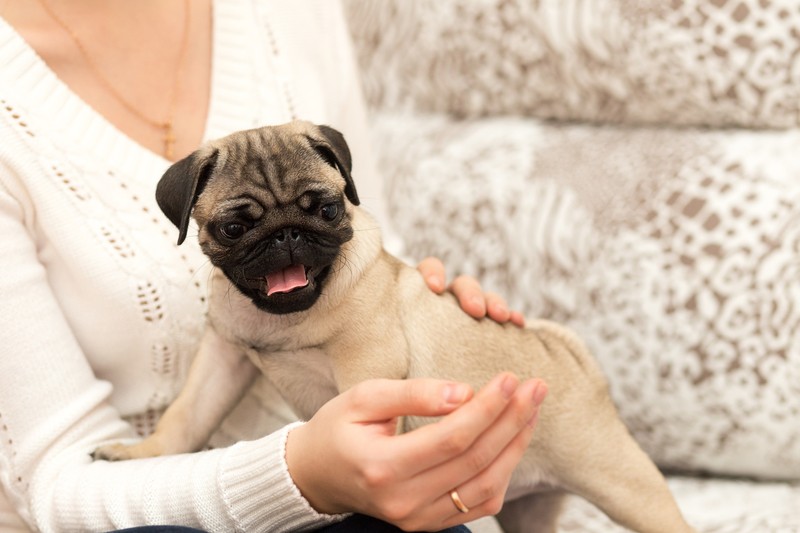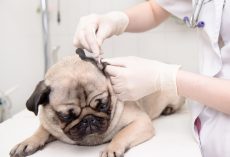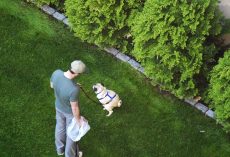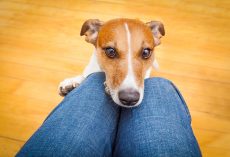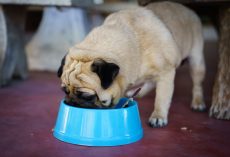Cancer is scary, but luckily there are steps you can take to help prevent cancer in your dog. Of course, a healthy diet is important as is exercising him daily. Don't forget that smoking around your dog is a big no no as is allowing him to sniff and potentially eat grass that is sprayed with chemicals regularly. Check out the important tips below:
Here are four things you can do to help prevent cancer in your dog:
1. Reduce Your Dog’s Exposure to Carcinogens
The word “carcinogen” is commonly defined as something that causes cancer. In reality, a carcinogen doesn’t cause cancer; it sets the stage for cancer to develop.
In other words, walking by a lawn with pesticide on it isn’t as risky as playing daily on that grass. Scope out your home and backyard for possible contaminants and remove or limit your dog’s exposure to them.
That said, pesticides are at the top of the list of concerns for your dog, and are one of two proven causes in pets, Dr. Post says. The chemical “2,4-D,” which is found in some common herbicides, has been linked to lymphoma in dogs. Keep your dog away from herbicides at least until the product has dried.
The other proven pet carcinogen is secondhand smoke.
Long-nosed dogs living in a pollutant-filled air, such as a smoky home or highly polluted city, are at higher risk for developing nasal carcinoma. On average, indoor air contains far more harmful pollutants than outdoor air.
With the human-dog comparison in mind, it’s no surprise that providing shade for your dog to reduce long-term exposure to sunlight (especially for dogs with white hair) is important.
What You Need to Do: To protect from environmental hazards, bathe your dog frequently to remove outdoor toxins on his coat and use foot baths to reduce the amount being brought into your home. Check your dog’s immediate environment for carcinogens and work to limit them.
2. Time Spay/Neuter Surgery Appropriately, If Possible
We believe the decision to spay or neuter your dog should be based more on your individual needs and ability to care for and manage your dog than on your dog’s cancer risk. However, the status of your dog’s reproductive structures is indeed a factor in the likelihood of your dog getting cancer.
“Some studies suggest that the risk of some cancer is higher in dogs who are neutered too early (before one year of age),” Dr. Lana says. “It’s being discussed quite a bit.”
Spaying/neutering before the age of one year is associated with a higher risk of osteosarcoma (bone cancer) and hemangiosarcoma (a rapidly growing tumor that originates in the blood vessels).
3. Provide Your Dog with a Healthy Lifestyle
Health starts with a normal weight. The National Cancer Institute links obesity in humans to increased risk of cancer of the esophagus, pancreas, colon, rectum, breast, kidney, thyroid, and gallbladder. Veterinary research agrees. An obesity-cancer link has been proven in dogs, too, especially for mammary and bladder cancers.
Regular exercise helps reduce stress, another lifestyle factor in the development of cancer.
What You Need to Do: Feed a good-quality food in appropriate amounts to keep your dog fit and slender. Be sure your dog gets plenty of exercise, and address stress issues by incorporating the help of a trainer or your veterinarian to isolate and eliminate the source.
4. Examine Your Dog's Body – Early Cancer Detection is Key
Of all the cancer preventatives we’ve discussed, the most important one is early detection. The earlier you catch a developing cancer, the higher the odds of a longer life.
Signs of cancer including frequent vomiting, difficulty breathing, lameness, and lethargy. It’s important to realize that some problems develop so slowly you may not notice until symptoms significantly worsen.
As your dog ages, his risk of cancer naturally rises, so make sure your veterinarian makes your dog’s wellness exams more involved over the years.
What You Need to Do: Learn what your dog feels like over every inch of his body, and every month, go over him, looking for bumps or lumps. Pay close attention to changes in eating habits, digestive upsets, or signs of sluggishness.
Now that you have several steps in mind to help prevent cancer from developing your dog you should feel a lot better. Yes, it's scary thinking about the possibility, but if you've done everything in your power to prevent cancer from happening, you can feel happy knowing that you've given your furry best friend the best life possible. Keep him healthy and he should stay healthy and cancer free thanks to you!
To continue reading about this important topic and how to prevent cancer in your dog read more at The Whole Dog Journal.

